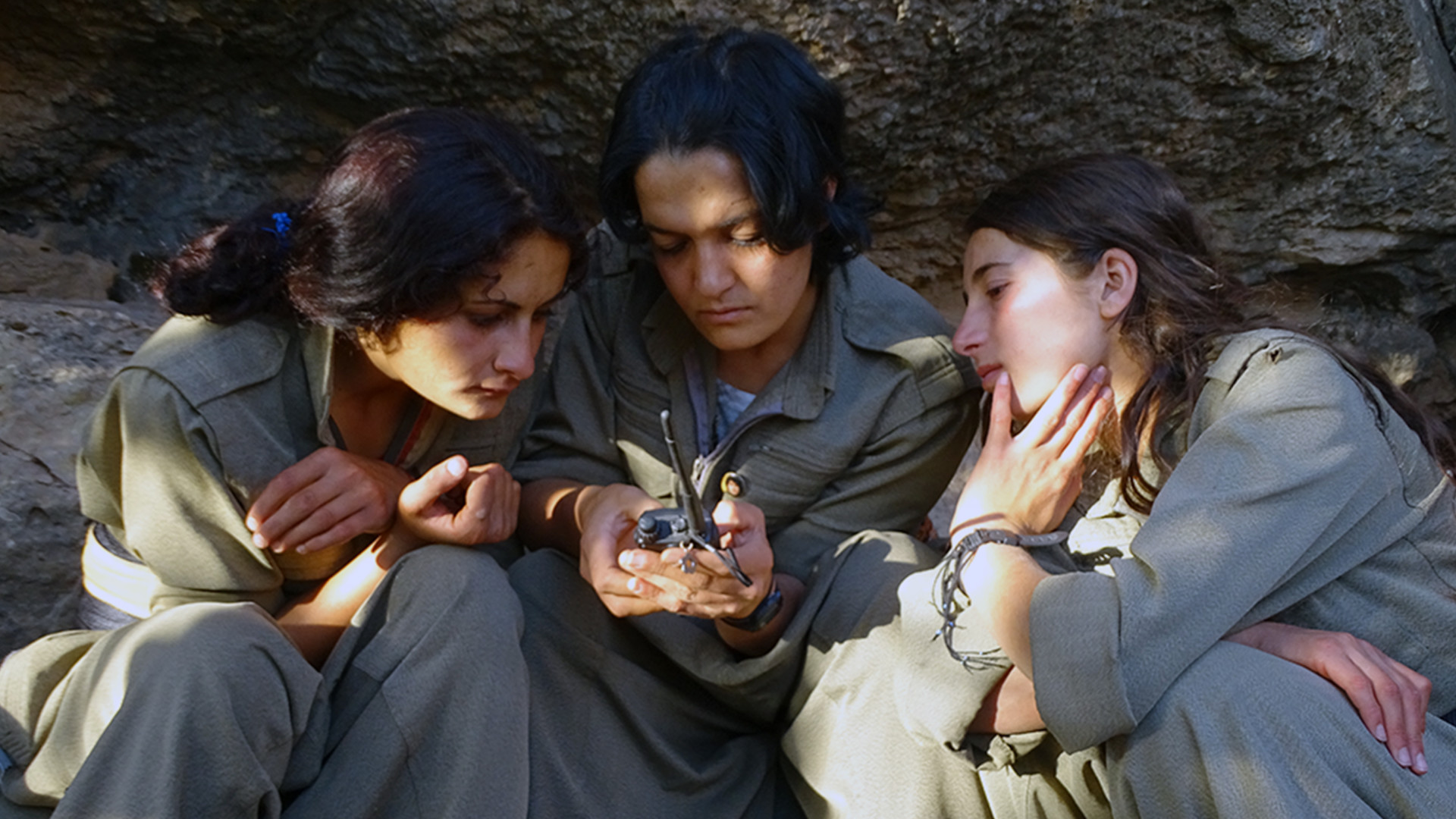To enter the mouth of the cave, one must crawl on all fours or slide forward as if imitating an upside-down spider. The orifice opens onto a walkway as if made for an adolescent, forcing anyone taller than 5 feet 2 inches to bow their head until the pathway widens into a cavern that measures about 500 to 650 square feet. It is here that two dozen female fighters for the Kurdistan Workers’ Party (PKK) live, learn and sleep. In the fall of 2016, I joined them as part of my yearlong research into the group’s workings and philosophy as well as to interview the young women who have left everything behind to join.
The cavern serves as a fully functioning barracks, clean and relatively warm, with colorful plastic carpets covering much of the floor and neatly packed sandbags with pink and yellow sheet cloth draped over them to divide the grotto into makeshift rooms, including a common area, a library and communal bedrooms. The PKK flags and a portrait of PKK leader Abdullah Öcalan — who since 1999 has been serving a life sentence in solitary confinement on an island off the Turkish coast — cover the sandbag walls, as do pictures of the fallen. Food could be found stuffed in corners and nooks and crannies, organized alongside weapons and ammunition.
I sat down with one of the fighters who goes by the nom de guerre Zinarîn. (The fighters are not allowed to share their birth names for security reasons.) She was almost 18 and had joined a year earlier, when she was a high school student in the city of Siirt, located in southeast Turkey. She recalled the excitement and fear she felt when she sneaked off from class one day and went into the school’s prayer room to change out of her uniform. She then walked off to the prearranged meeting with a PKK member at a safehouse.
“I was afraid to get caught, checking my watch all the time. Would my sister’s class have ended already, and would she have noticed that I was gone? Would my mom already know I was missing by now?” she said. But no one noticed her missing in time to stop her.
At the safehouse, Zinarîn joined two other young people who had arrived under similar circumstances, and the next day they all departed together with their recruiter and formally joined the PKK.
Like most other fighters I interviewed, Zinarîn had aspirations to go to battle and defend and fight for the Kurdish people. It was late in 2014, and the city of Kobani had especially weighed on her mind. Located in northern Syria, Kobani was already besieged by the Islamic State group, who were engaged in full battle with the Kurdish forces of the People’s Protection Units (YPG). (The YPG would later win the battle with the assistance of air cover from U.S. forces.)
But when Zinarîn’s PKK commanders refused to conscript and send her to the front line, she grew frustrated and angry. If not to fight, what else had she signed up to do? Why else had she left her family and friends and everything she knew behind?
“I had seen fighters on TV who were either going to war or dancing and singing,” Zinarîn said, referring to myriad media productions that glorify Kurdish war pursuits and are insatiably consumed by the youth. But “the reality turned out to be very different,” she added.
Zinarîn found herself sitting in a training camp in the mountains discussing books about the PKK ideology by day and shivering under a damp blanket by night. She still felt betrayed by the dissonance between image and reality, “especially when I see martyrs on TV, because then I want to go and fight,” she told me, almost cognizant of the youthful nature of her enthusiasm. The months she had already spent in the mountains with the PKK had brought some maturity and a renewed purpose.
“I don’t yell anymore when I am angry, or act stubbornly,” Zinarîn confided. “That’s what I have learned here, in sessions in which we criticize each other and ourselves. We are adults here,” she said.
Other young fighters echoed Zinarîn’s story. Evîndar, also 18, joined when she was just shy of her 17th birthday to escape her family’s threat of a forced marriage and also “to avenge a cousin” who had died as a PKK fighter.
There were fighters I could not locate but whose families I had interviewed, like Tîrêj, a teenager who hailed from the small town of Roboski, located in southeast Turkey. According to his parents, Tirej lost his two best friends when the Turkish army bombed a group of border traders at the Turkish-Iraqi border in 2011. He was 15. Over the next year, Tirej grew despondent and wary and, eventually, walked away from everything he knew and joined the PKK.
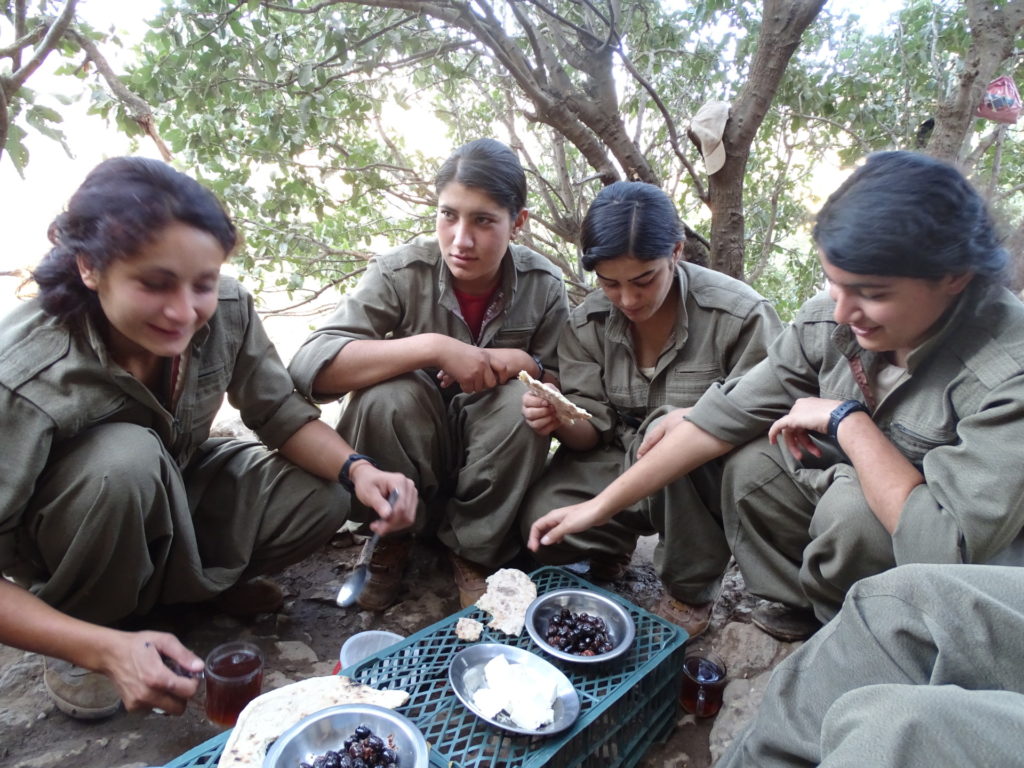
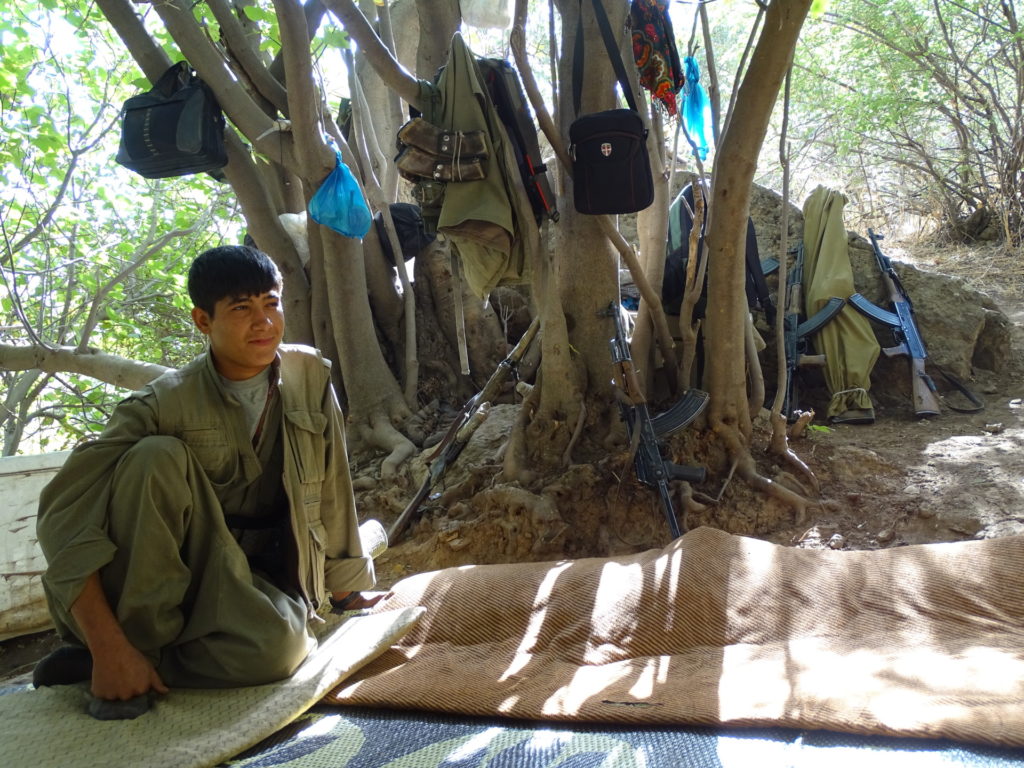
This phenomenon of minors and young adults leaving their families and towns and joining the guerrilla used to be more common in the 1980s and 1990s, the years of heightened armed struggle between the PKK and the Turkish state. The appeal to Kurdish youth was more than the opportunity to fight the Turkish army. Joining the group was also a form of resistance against the Kurdish feudal structure, like the long-standing traditions that pegged peasants and serfs against exploitative landlords who were aided by the Turkish state.
The PKK had not yet instilled its policy of returning recruits home who were deemed too young to join. Hêlîn, who was in her early 30s when we met, told me she had joined the PKK when she was 15, after Öcalan was captured and imprisoned by Turkey. Hesen, 37, joined when he was 14. He lost his leg in an ambush less than a year later. When I sat down with him, he wore a prosthesis, which helped him carry out his duties as an instructor and a builder of camps in the mountains.
Recruiting or conscripting children for armed struggle is of course a violation of international law. The Geneva Conventions, the Convention on the Rights of the Child and the Rome Statute of the International Criminal Court use clear language on the issue. The protocol in the Geneva Conventions states: “Children who have not attained the age of fifteen years shall neither be recruited in the armed forces or groups nor allowed to take part in hostilities.”
But there is less legal clarity when it comes to teenagers ages 16 to 18. Some conventions, like the Convention on the Rights of the Child, allow recruitment from the age of 16 but ban minors from taking part in active fighting.
The PKK — along with the YPG and the Women’s Protection Units (YPJ) in Syria — have signed agreements with international organizations to ban the recruitment and enlistment of child soldiers. Kurdish youth under the age of 16 years are sent back home when they show up asking to join the PKK, and those 16 to 18 will not be sent to the front lines.
“The best age to join the PKK is between 18 and 35,” explained Cemil Bayık, the co-leader of the Kurdistan Communities Union (KCK), the umbrella group under which the PKK operates.
Yet this has not stopped the churning of propaganda that appeals to young Kurds; stories that glorify battle and war against “the oppressor,” both real and perceived.
In “The Diaries of the Sur Resistance,” a TV series that blends real footage, diaries of wars and animation, armed youth groups affiliated with the PKK are shown vowing to defend the autonomy of their district of Sur, the historical heart of Diyarbakır, one of the towns in southeast Turkey that had declared itself “autonomous” after the PKK-Turkey peace process in 2015. Watching the show, it is difficult to overlook the motives behind the rousing music and images of “martyrs” projected onto the city’s well-known black basalt stone walls.
Indeed, the dozens of PKK-members with whom I spoke recalled how they had dreamt of blowing up Turkish army posts and killing the soldiers, detonating roadside bombs and destroying military vehicles with “everyone inside.” One after another, the young fighters told me how they wanted to avenge what they described to be the enduring trauma of their formative years, as they spent them in Turkey.
They referenced the forced assimilation demanded of them by the Turkish state, which does not allow Kurds to teach their native language in schools. They had grown up well aware of the legal repercussions endured by thousands of Kurdish activists, politicians, lawyers, journalists and others, many of whom continue to linger in Turkish prisons.
The trauma is intergenerational, sparing almost no Kurdish family from some experience of political persecution, mass murder, extrajudicial executions or displacement. In the 1990s, the Turkish army destroyed hundreds of Kurdish villages, and the Turkish authorities have yet to reconcile what unfolded during the notorious massacres of Dersim — at times referred to as genocide with possibly tens of thousands dead — in the 1930s.
But with all the young fighters’ talk of revenge, in the PKK many seem to find a renewed sense of purpose. As one of them, Ronahî, a woman in her 30s who joined just after she had reached adulthood, put it: “Gradually, I have learned that revenge is a much bigger concept than just violence. Revenge is also to invest in everything that the state doesn’t allow. Create something new. To live fully as a Kurd.”
Another fighter, Mizgîn, who was in her 40s, told me that she had joined the PKK having come from Kurdistan in Iran, when she was only 16 years old. Her parents had been Kurdish activists before they fled Turkey to Iran and had in fact given her their blessings when she told them she wanted to join the PKK, even with her ideas of fighting for glory.
“I thought I would die young, but look at me now,” she said. “I have learned that I didn’t come to the PKK to die, but to live.”
Fighters who join as adults also undergo a reeducation and experience a rebirth into the ideology cultivated by Öcalan. Ronahî, for example, a guerrilla fighter tasked with teaching Kurdish to foreigners and Kurds alike, joined the PKK in her early 20s. She was approaching 40 when I met her.
“I have hardly ever used my weapon,” she said. Her demeanor was soft and pensive. “In the beginning, I pushed my commanders to send me to Turkey to fight, but they refused. My commander told me that my dreams about fighting and martyrdom were much too narrow. I needed to be educated. I learned to dream about life instead of martyrdom,” Ronahî added.
Perhaps best befitting to her constitution, Ronahî had, over the years, become involved in developing the PKK’s strategic thinking on women’s issues and, as a result, she attended courses about a wide array of subjects before becoming a teacher. Ronahî discovered her talent for learning languages, and she imparts her skills both as a teacher and a translator. All over the camps, I met PKK members who had joined to fight but have instead settled into noncombatant roles like working in a workshop to make uniforms or as an explosives expert to create livable caves. There are jobs like guards for senior KCK members, and distributors of food, fuel, blankets, clothes, ammunition and weapons. There are committees and roundtables that discuss economic and cultural strategies, and how to continuously better the lives of women.
“People often think that the PKK is about weapons, but that’s not the case at all. The PKK is about building an alternative,” Ronahî told me.
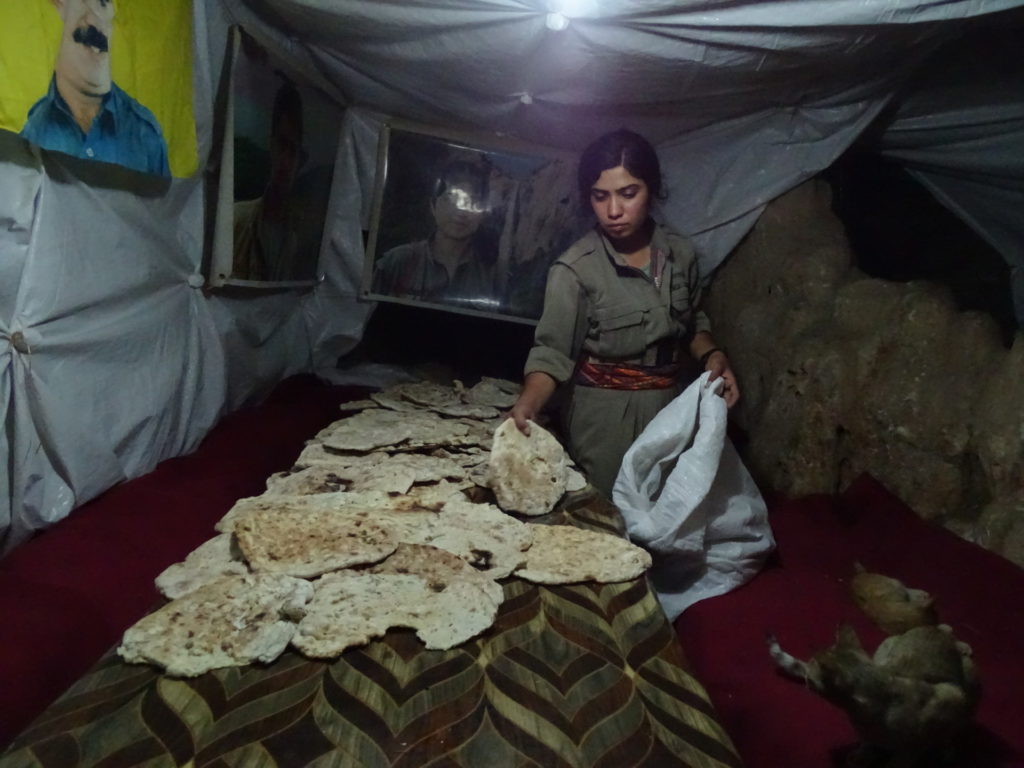
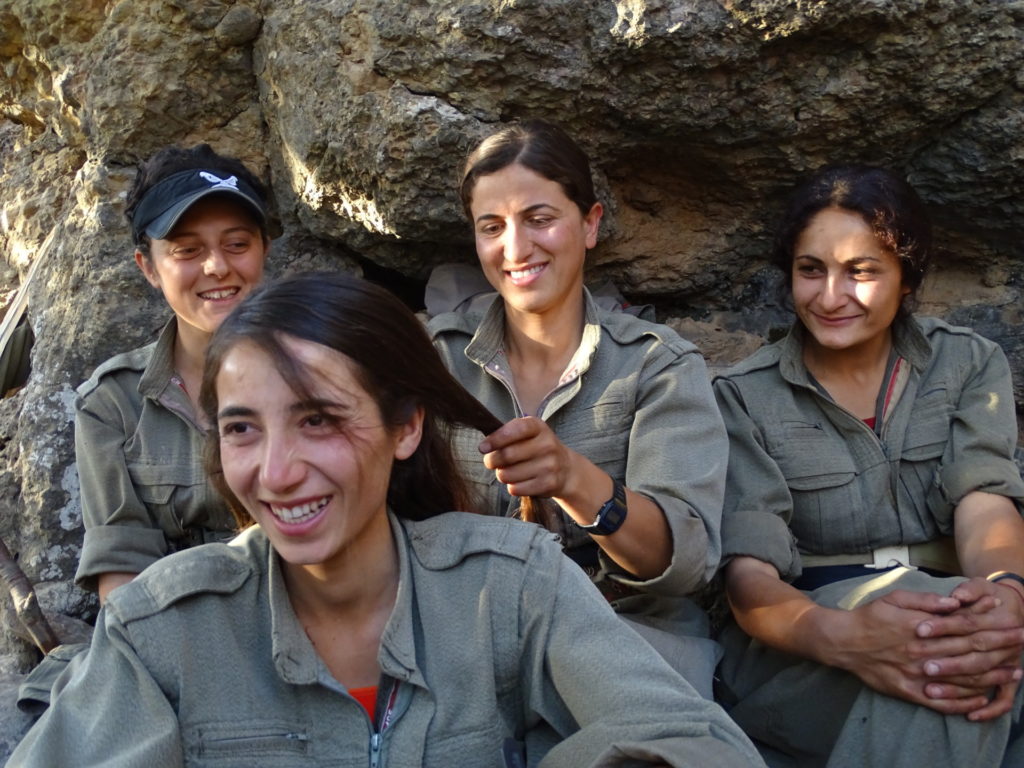
This “alternative,” is best understood through the organizational structure of the KCK, which oversees armed and unarmed groups in Iraq, Iran, Turkey and Syria. (For example, the Democratic Union Party, or PYD, in Syria is an unarmed group while the YPG and YPJ are both armed forces). The PKK includes within its structure both an unarmed group as well as armed forces, including the People’s Defense Forces, or HPG, and the Free Women’s Units YJA STAR. Minors can join the PKK, but not the HPG or YJA STAR. These armed forces engage in protecting the autonomy of an area, like in the northeast of Syria, or they fight in a guerrilla war, like in Turkey.
Unlike common misconceptions, the KCK’s overriding vision does not entail the establishment of an independent Kurdish nation-state, but rather it is rooted in the ideals of “democratic confederalism,” and is heavily influenced by the philosophy of the late American Marxist thinker and activist Murray Bookchin.
Bookchin, who was born and raised in New York City as the son of Jewish Russian émigrés, made a name for himself as a trade union organizer and communalist. (In the 1960s he helped Puerto Rican squatters in NYC farm organic fish in tenement basements.) He coined the term Social Ecology, which means that humans should not aim to dominate nature, but rather we shall try to “steer” it.
KCK ideology is rooted in other Bookchin ideas; that the modern nation-state is an inherently suppressive structure because it favors an unjust hierarchy: rich over poor, old over young, men over women, racial or ethnic homogeneity over diversity.
The KCK has been working on educating its members and bringing these ideas into practice, specifically in the northeast of Syria starting in 2012, in the early days of the Syrian war when President Bashar al-Assad withdrew his troops from Kurdish areas to fight Syrian rebels elsewhere.
Whoever “goes to the mountains” — the metaphor that Kurds use for joining the PKK — must undergo an education on a wide range of issues, from the basics of evolutionary biology and early human migratory patterns out of Africa to the intricacies of Kurdish nationalism and many things in-between before they graduate into becoming a working member under the KCK, or one of its subsidiaries. A number of the new recruits will eventually become fighters in the HPG or YJA STAR, but not before they have learned exactly what it is they are fighting for.
No matter how Kurdish nationalism may unfold in the coming years, those who have gone to the mountains know one thing for certain. There is no returning to the places whence they fled.



